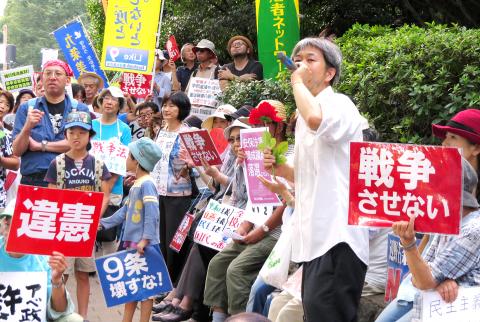Japanese opposition groups yesterday vowed to challenge laws passed overnight that clear Japanese troops to fight abroad for the first time since World War II, while Beijing voiced concern.
Japan’s ruling coalition, led by Japanese Prime Minister Shinzo Abe, pushed the laws through in the early hours of the morning after days of tortuous debate that at points descended into physical scuffles in parliament.
For the first time in 70 years, the new regulations are to give the Japanese government the power to send the military into overseas conflicts to defend allies, even if the nation itself is not under attack.

Photo: AFP
Abe said the laws are necessary to protect against threats from an increasingly belligerent China and unstable North Korea, but opponents fear the vague wording could see Japan dragged into far-flung foreign wars.
“This is not an end,” said Renho, a senior lawmaker from the main opposition Democratic Party of Japan, who goes by one name.
“Let us make it the beginning of the beginning,” she said on Twitter.
Social Democratic Party senior lawmaker Mizuho Fukushima told a crowd who gathered outside parliament during the debate: “Abe’s Cabinet criminals... Let us get them out of here.”
China voiced its concerns, with its Ministry of Foreign Affairs saying the changes are an “unprecedented” change in Japan’s military stance since World War II, and urged Tokyo to “pay attention to security concerns of its neighbors.”
“We solemnly urge Japan to learn the lessons of history ... uphold the path of peaceful development and act cautiously in the areas of the military and security, and do more to help push regional peace and stability rather than the opposite,” it said.
Speaking after the vote, Abe said the changes were “necessary in order to protect people’s lives and peaceful way of life.”
“This is designed to prevent wars,” he told journalists.
A group of about 300 protesters gathered outside parliament, calling for the legislation to be abolished and vowing never to stop their fight against Abe.
“Our battle will never end. This is just the beginning,” said Keisuke Yamamoto, an organizer from one of the citizen groups that have been leading weeks of rallies. “We will resort to every possible measure, including bringing the case to the courts... We cannot let this movement fizzle out now.”

SECURITY: As China is ‘reshaping’ Hong Kong’s population, Taiwan must raise the eligibility threshold for applications from Hong Kongers, Chiu Chui-cheng said When Hong Kong and Macau citizens apply for residency in Taiwan, it would be under a new category that includes a “national security observation period,” Mainland Affairs Council (MAC) Minister Chiu Chui-cheng (邱垂正) said yesterday. President William Lai (賴清德) on March 13 announced 17 strategies to counter China’s aggression toward Taiwan, including incorporating national security considerations into the review process for residency applications from Hong Kong and Macau citizens. The situation in Hong Kong is constantly changing, Chiu said to media yesterday on the sidelines of the Taipei Technology Run hosted by the Taipei Neihu Technology Park Development Association. With

A US Marine Corps regiment equipped with Naval Strike Missiles (NSM) is set to participate in the upcoming Balikatan 25 exercise in the Luzon Strait, marking the system’s first-ever deployment in the Philippines. US and Philippine officials have separately confirmed that the Navy Marine Expeditionary Ship Interdiction System (NMESIS) — the mobile launch platform for the Naval Strike Missile — would take part in the joint exercise. The missiles are being deployed to “a strategic first island chain chokepoint” in the waters between Taiwan proper and the Philippines, US-based Naval News reported. “The Luzon Strait and Bashi Channel represent a critical access

CARROT AND STICK: While unrelenting in its military threats, China attracted nearly 40,000 Taiwanese to over 400 business events last year Nearly 40,000 Taiwanese last year joined industry events in China, such as conferences and trade fairs, supported by the Chinese government, a study showed yesterday, as Beijing ramps up a charm offensive toward Taipei alongside military pressure. China has long taken a carrot-and-stick approach to Taiwan, threatening it with the prospect of military action while reaching out to those it believes are amenable to Beijing’s point of view. Taiwanese security officials are wary of what they see as Beijing’s influence campaigns to sway public opinion after Taipei and Beijing gradually resumed travel links halted by the COVID-19 pandemic, but the scale of

Pope Francis is be laid to rest on Saturday after lying in state for three days in St Peter’s Basilica, where the faithful are expected to flock to pay their respects to history’s first Latin American pontiff. The cardinals met yesterday in the Vatican’s synod hall to chart the next steps before a conclave begins to choose Francis’ successor, as condolences poured in from around the world. According to current norms, the conclave must begin between May 5 and 10. The cardinals set the funeral for Saturday at 10am in St Peter’s Square, to be celebrated by the dean of the College